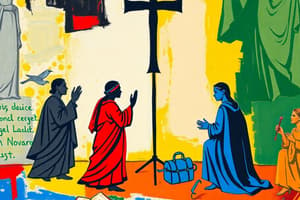Podcast
Questions and Answers
What is included in a person's right to life?
What is included in a person's right to life?
- The right to own multiple properties
- Having basic needs for food, shelter, and healthcare met (correct)
- The ability to make a profit from work
- Freedom to exploit natural resources
How does the concept of 'Option for the Poor' define social responsibility?
How does the concept of 'Option for the Poor' define social responsibility?
- Ensuring that wealth is centralized
- Prioritizing the needs of the affluent
- Focusing solely on individual success
- Eliminating inequalities affecting the poor (correct)
What fundamental rights should be respected in relation to workers?
What fundamental rights should be respected in relation to workers?
- The right to unpaid internships
- The right to unlimited working hours
- The right to override safety regulations
- The right to fair wages and to join unions (correct)
What is the moral test identified for assessing societal justice?
What is the moral test identified for assessing societal justice?
How should the economy function according to the principles discussed?
How should the economy function according to the principles discussed?
What does solidarity among individuals entail?
What does solidarity among individuals entail?
What can diminished work opportunities lead to in terms of personal feelings?
What can diminished work opportunities lead to in terms of personal feelings?
What is a key aspect of economic activity as per the content presented?
What is a key aspect of economic activity as per the content presented?
What is the primary purpose of Catholic Social Teaching?
What is the primary purpose of Catholic Social Teaching?
Which principle emphasizes the sacredness of human life and dignity?
Which principle emphasizes the sacredness of human life and dignity?
What element is NOT included in the common good?
What element is NOT included in the common good?
Which principle reflects the Church's stance on social support and community development?
Which principle reflects the Church's stance on social support and community development?
Which statement about human rights and responsibilities is accurate?
Which statement about human rights and responsibilities is accurate?
What is NOT a principle of Catholic Social Teaching?
What is NOT a principle of Catholic Social Teaching?
Which principle stresses the importance of social and community networks?
Which principle stresses the importance of social and community networks?
Which of the following is a reason why the dignity of the human person is vital in Catholic Social Teaching?
Which of the following is a reason why the dignity of the human person is vital in Catholic Social Teaching?
Flashcards are hidden until you start studying
Study Notes
Overview of Catholic Social Teaching
- Examines human society through the lens of the Gospel and Church Tradition.
- Aims to guide Christians in fulfilling Jesus' mission in the world.
Core Principles
-
Life and Dignity of the Human Person:
- Human life is sacred; dignity is the foundation of morality.
- All people hold equal value with inherent dignity from God.
- Defense of human life aligns with the fifth commandment.
-
Call to Family, Community, and Participation:
- Family is the primary social institution needing support.
- Human growth occurs within community settings; fulfillment is social.
- Society must ensure respect for rights, social well-being, and peace for the common good.
-
Rights and Responsibilities:
- Protection of human rights and fulfilling responsibilities fosters healthy communities.
- Fundamental rights include the right to life, basic needs, and opportunities for dignity.
- Duties exist towards individuals, families, and society for the common good.
-
Option for the Poor and Vulnerable:
- Assess moral actions by their impact on the most vulnerable.
- Emphasizes the needs of the poor as a priority for justice and charity.
- Inequalities must be eliminated to uphold dignity and meet basic needs.
-
Dignity of Work and Rights of Workers:
- Economy should serve people; work reflects participation in creation.
- Work's absence diminishes self-worth; worker rights include fair wages and union participation.
- Economic efforts must prioritize the needs of the community rather than profit for the few.
-
Solidarity:
- Recognizes the interconnectedness of all humanity, transcending differences.
- Justice involves collaboration with others; embracing a global perspective on love and support.
Additional Principles
- Charity and Justice: Integral to the mission of building community and support.
- Promotion of Peace: Essential for societal welfare and common good.
- Political Participation: Encouraged for citizens to influence governance.
- Liberation: Focus on freeing those oppressed by societal inequalities.
Summary of Key Themes
- Catholic social teaching integrates moral imperatives with social issues, advocating for a society that values human dignity, justice, and community well-being.
Studying That Suits You
Use AI to generate personalized quizzes and flashcards to suit your learning preferences.




